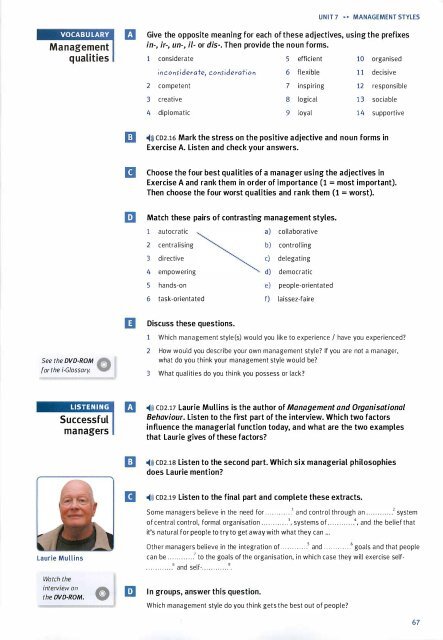Market_Leader_2011_Upper_SB_www.frenglish.ru
Create successful ePaper yourself
Turn your PDF publications into a flip-book with our unique Google optimized e-Paper software.
Management<br />
qualities<br />
B<br />
UNIT 7 n-<br />
MANAGEMENT STYLES<br />
Give the opposite meaning for each of these adjectives, using the prefixes<br />
in-, ir-, un-, ii- or dis-. Then provide the noun forms.<br />
1 considerate 5 efficient 10 organised<br />
il)co11>iderate, co11s-ideratio11 6 flexible 11 decisive<br />
2 competent 7 inspiring 12 responsible<br />
3 creative 8 logical 13 sociable<br />
4 diplomatic 9 loyal 14 supportive<br />
•O co2.16 Mark the stress on the positive adjective and noun forms in<br />
Exercise A. Listen and check your answers.<br />
E<br />
Choose the four best qualities of a manager using the adjectives in<br />
Exercise A and rank them in order of importance (1 = most important).<br />
Then choose the four worst qualities and rank them (1 = worst).<br />
Match these pairs of contrasting management styles.<br />
1 autocratic a) collaborative<br />
2 centralising b) controlling<br />
3 directive c) delegating<br />
4 empowering d) democratic<br />
5 hands-on e) people-orientated<br />
6 task-orientated f) laissez-faire<br />
See the DVD-ROM <br />
for the i-Glossary. W<br />
D<br />
Discuss these questions.<br />
1 Which management style(s) would you like to experience I have you experienced?<br />
2 How would you describe your own management style? If you are not a manager,<br />
what do you think your management style would be?<br />
3 What qualities do you think you possess or lack?<br />
LISTENING<br />
Successful<br />
managers<br />
rJ >l) co2.17 Laurie Mullins is the author of Management and Organisational<br />
Behaviour. Listen to the first part of the interview. Which two factors<br />
influence the managerial function today, and what are the two examples<br />
that Laurie gives of these factors?<br />
l!I >l) co2.1s Listen to the second part. Which six managerial philosophies<br />
does Laurie mention?<br />
II >l) co2.19 Listen to the final part and complete these extracts.<br />
Some managers believe in the need for . . . . . . . . . . . . 1 and control through an ............ 2 system<br />
of central control, formal organisation . . . . . . . . . . . . 3, systems of . . . . . . . . . . . . 4, and the belief that<br />
it's natural for people to try to get away with what they can ...<br />
Laurie Mullins<br />
Wa tch the<br />
interview on<br />
the DVD-ROM.<br />
Other managers believe in the integration of . . . . . . . . . . . . 5 and . . . . . . . . . . . . 6 goals and that people<br />
can be . . . . . . . . . . . . 7 to the goals of the organisation, in which case they will exercise self·<br />
•...•...•... 8 and self-. ........... 9•<br />
l:J In groups, answer this question.<br />
Which management style do you think gets the best out of people?<br />
67


